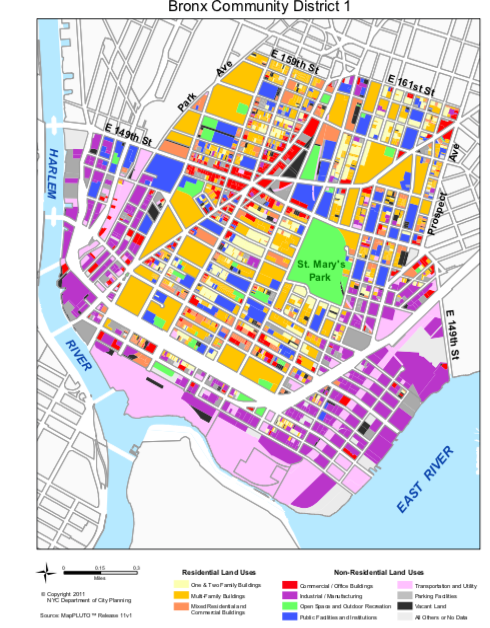When Cedric Loftin, district manager for Community Board 1 in Mott Haven, retired in Summer 2021, he collected pay for vacation and sick leave never taken over 31 years on the job. That has left no room in the budget to hire a replacement manager.
For at least 15 months, Mott Haven, Melrose and Port Morris have had no board manager to deal with a range of community concerns, from proposed housing developments to the pandemic to gun violence.
This crisis is not unique to the Bronx. The City NYC recently reported the same situation in Williamsburg, caused by the retirement of Gerry Esposito, who was Brooklyn CB1’s district manager for 45 years. The amount paid out to Loftin and Esposito was enough to put their community boards in the red.
At the end of Loftin’s 31 years of service, he received a Managerial Lump Sum Payment of $122,845.84, according to the City comptroller’s office. This payment was for 135 days of annual leave and 88 sick days that were unused during his tenure.
According to Checkbook NYC data, the Community Board’s entire budget for personal services for 2021 was $230,580. Loftin’s regular annual salary was $145,190.
The hiring of Loftin’s replacement was delayed not only due to budget constraints but also administrative hassles. The job was posted on the community board website last spring and, according to Board Chair Arline Parks, 15 resumes were received. The board’s executive committee selected three finalists.
However, Parks said the board was notified in mid-August that they were required to re-post the position on a citywide hiring website. The three finalists had to re-apply through that portal and by city regulations, the position must remain open until Oct. 31, Parks said.
Parks, who is also vice chair and CEO of the Diego Beekman Mutual Housing Association, promised a speedy selection in November.
Diana Ayala, the City Council’s deputy speaker whose district includes Mott Haven and Port Morris, expressed concern that major issues in the community – the opioid crisis, gun violence, poverty, unemployment, covid response, among others – have been pushed aside in the absence of strong leadership.
“I get that they are really stressed out because they don’t have the resources that they need right now, but that’s because there was little oversight to help manage the time off of the staff,” she said.
Ayala questioned the board’s leadership, stating, “A real executive committee could have tried to remediate the situation a long time ago. If there had been appropriate oversight to begin with, this wouldn’t have happened.”
Ayala said her office has communicated with the borough president’s office about the staffing crisis but was told the district was forced to “wait until the clock runs out on whatever arrangement [Loftin] had” and added, “Our hands are kind of tied.” A community coordinator is the only other staff member on the board’s payroll.
Parks did not respond for comment on this story, but at the full board meeting on Sept. 29, she said that the executive committee “desperately has to get that position filled” and acknowledged that the new district manager will face a number of challenges.
Residents at the meeting voiced strong concerns about burglaries, the health impacts of congestion pricing, resources for asylum seekers, and marijuana sales near schools.
Parks expressed frustration over unresolved problems and believes that the neighborhood is at risk of becoming “unlivable and unsafe.” Her workload, she said, has become impossible, given that the chairperson is not a full-time employee.
Parks wants to arrange an urgent community forum with elected officials. However, she also suggested that Community Board 1 needs to better organize itself, noting that board member attendance at many meetings barely reaches quorum.
Community boards across the city are struggling with inadequate funding and resources. According to a 2021 report by the Future of Community Boards Working Group, boards feel they are “do[ing] more with less.” The report states that community boards have not had a significant increase in baseline funding since 2014, compared to a 71% increase in the budget for the mayor’s office.
Faced with chronic underfunding, some community boards are nonetheless better equipped than others. Some are doing their own fundraising and have volunteers who can assist with social media and other important functions. But some CBs lack these resources, thereby increasing inequities, the report noted.
Clarisa Alayeto, a lifelong Mott Haven resident and CB1 board member since 2017, believes the time has come to “start from scratch” and “reimagine” how community boards should be. Without a district manager, she feels the meetings have become too long and unstructured and that her community board is declining in respect and reputation.
“It’s terrible that we don’t have a district manager,” Alayeto said, noting that it doesn’t reflect well to the public to be without leadership. With the rapid development and changes in the area, she said, “You would think it would be the first priority to get a district manager in that seat. And it’s been very delayed and no one has been notified.”
Board members other than committee chairs, Alayeto said, were not involved in any aspect of the district manager hiring process. She also mentioned acquaintances who applied to be board members and never got a response. In general, Alayeto said the board is getting information “at the last minute or after the fact” and there is little transparency in important processes and decisions.
And yet, Alayeto remains committed to the neighborhood she deeply cares about.
“Our elected officials who are in office today, they have a lot of responsibility to put those issues to the forefront and to be able to make the change,” she said. “And it’s within their control.”

